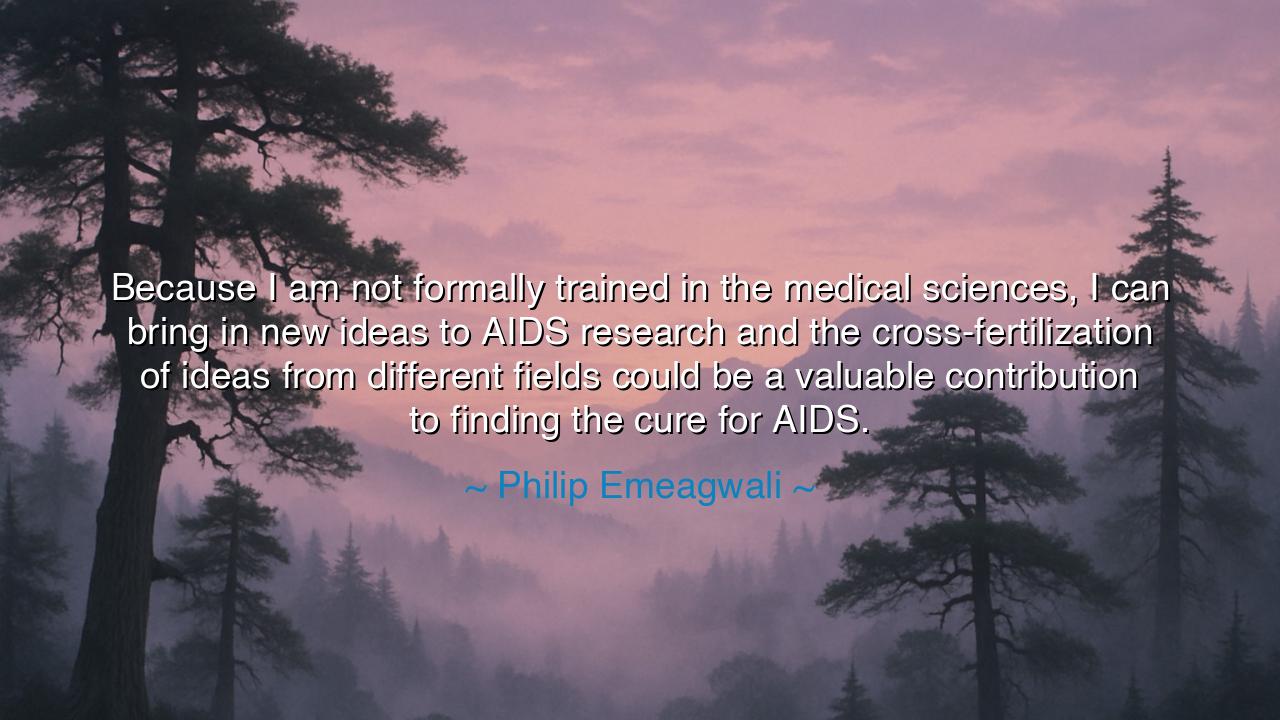
Because I am not formally trained in the medical sciences, I can
Because I am not formally trained in the medical sciences, I can bring in new ideas to AIDS research and the cross-fertilization of ideas from different fields could be a valuable contribution to finding the cure for AIDS.






Hearken to the words of Philip Emeagwali, whose reflection celebrates the power of perspective, curiosity, and innovation. He declares, “Because I am not formally trained in the medical sciences, I can bring in new ideas to AIDS research and the cross-fertilization of ideas from different fields could be a valuable contribution to finding the cure for AIDS.” In these words lies a timeless truth: the boundaries of human knowledge are expanded not only by mastery of a single discipline, but by the courage to bring fresh insight from distant realms of understanding.
Since the earliest days of human inquiry, wisdom has often emerged at the intersection of diverse fields. In Alexandria, scholars of astronomy, medicine, and mathematics convened to cross-pollinate ideas, discovering truths that no single specialty could yield alone. Emeagwali’s insight echoes this ancient principle: innovation often arises when those unbound by conventional training approach problems with new eyes, challenging assumptions and exploring uncharted conceptual territory.
Consider the story of Leonardo da Vinci, whose lack of formal specialization did not hinder him, but rather amplified his creativity. By blending anatomy, engineering, and art, he envisioned innovations that anticipated centuries of discovery. Like Emeagwali, Leonardo demonstrates that the outsider’s perspective—unconstrained by traditional dogma—can catalyze breakthroughs in fields as complex and urgent as medical research.
Emeagwali emphasizes the value of cross-fertilization of ideas, the merging of knowledge from seemingly unrelated disciplines. Ancient sages recognized that wisdom does not exist in silos: Pythagoras applied mathematics to music, Hippocrates drew observation from natural phenomena to treat disease, and Aristotle synthesized ethics, biology, and politics into unified systems. In the same spirit, Emeagwali suggests that solving complex challenges like AIDS requires integrating insights from computing, physics, and other domains to illuminate novel pathways toward solutions.
This reflection also underscores the virtue of humility combined with ambition. Though lacking formal training, Emeagwali approaches the challenge with respect for expertise while trusting the value of his unique perspective. Ancient philosophers taught that true wisdom arises when knowledge is tempered by recognition of one’s limits and openness to collaboration. By acknowledging the boundaries of his formal training, he opens the door to contributions that others entrenched in tradition might overlook.
The moral lesson emerges: creativity and progress flourish when courage and curiosity meet opportunity, especially when one is willing to traverse boundaries. Innovation is not the sole province of specialists; it belongs to those who see problems differently, who dare to connect the unconnected. Emeagwali teaches that fresh eyes and interdisciplinary thinking can transform even the most intractable challenges into avenues of discovery.
Practical guidance flows naturally: cultivate curiosity beyond your immediate field, seek knowledge across disciplines, and embrace the outsider’s perspective. Collaborate with experts, respect their expertise, and offer your unique insight as a bridge to new understanding. By combining openness, creativity, and humility, one can contribute meaningfully to the advancement of human knowledge and the alleviation of suffering.
Thus, heed the wisdom of Philip Emeagwali: let your distinct perspective, even if unconventional, become a source of innovation. Approach complex problems with curiosity, courage, and the willingness to draw connections across fields. In doing so, you honor both the spirit of discovery and the urgency of human need, illuminating paths toward breakthroughs that may change the course of history and offer hope to generations yet unborn.






AAdministratorAdministrator
Welcome, honored guests. Please leave a comment, we will respond soon